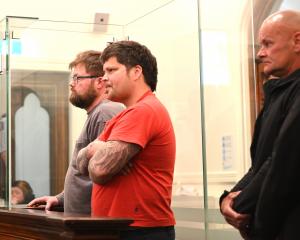
A remorseless rapist on parole was given a volunteer role at The Salvation Army despite it knowing about his criminal history.
Dwayne Douglas Keats (47) went on to repeatedly rape a woman he met through his work, and the charity says it is unsure how he got the job.
The decision to employ the sex offender, shortly after his release by the Parole Board in 2016, was made at a "local level", a Salvation Army spokeswoman said.
A Ministry of Justice check was completed, revealing the conviction for which he had spent the past seven years in prison, but Keats was given the position of truck driver, working from the sorting warehouse in central Dunedin.
So how did a sexual predator get a job working among vulnerable people?
"The Salvation Army is extremely concerned about this incident and is undergoing a thorough investigation into the circumstances of Dwayne Keats’ work with us," the spokeswoman said.
"It appears that he was taken on as a volunteer on the proviso that he not engage with the public."
Keats appeared in the High Court at Dunedin earlier this month, where the Crown argued the risk he presented to women was so high he should be behind bars indefinitely.
One psychologist who assessed the defendant found the definite presence of psychopathy and another said there was "little cause for optimism" since he had committed the violent sexual abuse while under the supposed spotlight of Corrections.
All agreed Keats was at high risk of further sexual offending.
Justice Gerald Nation, though, decided "by a narrow margin" that the man was not beyond redemption.
He jailed Keats for 15 years and imposed a minimum non-parole period of eight years.
The rapist vowed to appeal the convictions.

Crown Law confirmed it too was considering an appeal, over the preventive-detention issue, and a spokeswoman said a final decision would be made by the end of the month.
In 2009, Keats was sentenced to eight years’ imprisonment after raping his first victim.
The woman had ended their two-and-a-half-year relationship but the defendant had no intention of letting go.
After turning up at her home uninvited, Keats forced himself on his victim as she yelled "I don’t want to do this".
The judge who later sentenced him said the attack was fuelled by anger and a desire to humiliate the woman.
Keats had served seven of eight years when the Parole Board saw him in September 2016.
At that hearing, panel convener Neville Trendle — a former assistant police commissioner and barrister of 40 years’ experience — outlined the prisoner’s stilted progress while behind bars.
At a previous hearing, Keats was assessed as having "limited insight into his offending and awareness of victim issues", and there was no indication in the board’s decision that that attitude had changed.
Mr Trendle also noted Keats had recently been fighting in prison, misconduct which landed him with six days of cell confinement.
"The instance was relatively minor and not one that need further concern us. It does highlight, however, the pattern that seems to emerge with Mr Keats is the difficulty he has in relating to others," he said.
The Parole Board said the prisoner had a very brief period doing Release to Work but it was not the reintegration efforts the panel had in mind, Mr Trendle said.
Regardless of all that, they agreed to release him.
"The board has reached the conclusion that with around 12 months to go, Mr Keats’ risk to the community can be managed by way of release conditions," Mr Trendle said.

Critically, though, he was not ordered to inform his Probation officer of any employment he gained, nor had he to make them aware of any intimate relationships he formed — conditions that are routinely imposed on high-risk offenders.
In response to inquiries about the report, a Parole Board spokeswoman said it did not comment on individual cases.
On his release, Keats moved into a house in the southwest Dunedin suburb of Lookout Point and quickly made an impression on his neighbour, a single woman who had moved to the city from the North Island after the breakdown of her marriage eight months earlier.
Rachel* told the Otago Daily Times she initially found the man next door unsettling and odd.
"Every time I got home from work, he was always checking the mail and trying to initiate conversation across the fence," she said.
"He was very shifty and wouldn't look me in the eye."
Over the ensuing weeks she felt increasingly uncomfortable with Keats in such close proximity and she would hear knocking on her door late at night, which she ignored.
Then, one morning, the man approached her to inform her he had disturbed an intruder who had earlier been snooping around her property.
"I feel like there was a part of me that actually went for it. I believed him," Rachel said.
"The fear was in my head at the time and I thought ‘Maybe I've misjudged this guy’."
Keats told her not to worry about the situation; he would liaise with the police and let her know how the investigation progressed.
Rachel decided she would approach police herself to find out more, but officers were left scratching their heads when she described the supposed circumstances of the crime.
Keats had cooked up the story in a bid to win her trust, leave her feeling threatened, cause her to feel reliant on him and paint himself as a protector.
Just a helpful neighbour looking out for a vulnerable woman.
But Rachel had uncovered the lie.
"It was total shock, a feeling of instant fear," she said.
"What am I dealing with here? Why would someone do this?"
She took to the internet to try to uncover more about Keats’ background, with limited success.
She was stonewalled by the real estate company which rented out the house, and police were reluctant to give out more information, also citing privacy grounds.
One officer, however, took her aside and suggested her fears may be well placed.
For the next four months, Rachel slept barricaded inside her bedroom, furniture piled against the door, until Keats moved out.
It was only afterwards, when the man was charged with a slew of sex offences and police approached her to take a statement, that she realised how close she had come to being a victim.
"I dodged a bullet, no doubt about it," she said.
Her advice to women in her position?
"If you've got a bad feeling about someone, trust it."
Within months of his release on parole, Keats had managed to score a volunteer role at the Salvation Army driving a truck.
Through that role, he met his second victim, and she told the court at his sentencing she felt powerless against his will.
"I feel like it was planned, like I was a puzzle piece he had to have," Amanda* said.
"He was saying that all he wanted was comfort and sympathy when he said his daughter had died."
But like much of what Keats said, it was a lie.
The victim said she tried to avoid him and break free of his grip.
"I would tell him I was tired and just wished to go to sleep but he would insist on coming over to my house," Amanda said.
"I tried to be nice not to upset him."
Nothing worked.
Keats violated her repeatedly; in her car, her lounge, her kitchen.
On occasion, he would put his hands around Amanda’s throat and force his considerable weight down on her.
"I thought I was going to die ... my windpipe felt like it was going to disconnect," the victim said.
"I thought people like [him] were only in the movies."
After the trauma she would spend hours in the shower, scrubbing herself, and was sometimes unable to walk for days.
In court, she had the last word against the man in the dock.
"I can’t take what you’ve done away from me but I want to stand up for other women. I believe you are a danger to this community and to all women," Amanda said.
"You prey on women who have a good heart."
Yet, it may never have happened had The Salvation Army heeded the warnings.
The ODT understands a staff member discovered Keats’ criminal history and raised it with a senior manager, but nothing was done.
An employee of The Salvation Army at the time, Carole*, who spoke on condition of anonymity, said she encountered the defendant when he came into her store asking about a position there.
She said Keats seemed "very charming".
Carole was later informed by a colleague from another branch that the man was a rapist.
"I was absolutely gobsmacked," she said.
She was particularly staggered that Keats had been allowed into the charity shop environment.
"You’re working often with vulnerable people in volunteer roles. It’s a very fragile mix," Carole said.
"[Employing Keats] was just like throwing petrol on the fire."
Within months, the truck driver had been charged and was back behind bars.
"I felt sick," she said.
"Why was he in such a public position?"
She hoped the fiasco should be "a huge wake-up call" to the organisation.
"The Salvation Army needs a kick in the pants — I feel they’re partly culpable for this," Carole said.
"How did this happen? Who let this happen? Who signed this off and thought this was OK?"
The Salvation Army — which refused interviews with the ODT, responding only to written questions — confirmed an independent investigator had been engaged to look into the case last week.
Among the issues they would consider were how Keats got the job he did and how much contact he had with the public.
That investigation was likely to end early next month, a spokeswoman said.
She said there was now no-one in the country with serious sex convictions working for The Salvation Army — "to the best of our knowledge".
*Names changed to protect sources’ identities.











